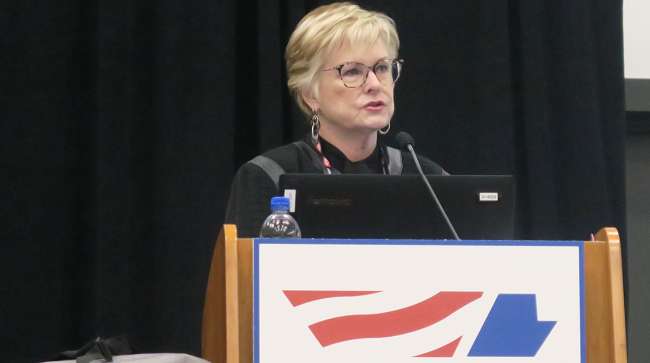Senior Reporter
Family Business Leader Says Trucking Central to Economy's Success

[Stay on top of transportation news: Get TTNews in your inbox.]
SAN DIEGO — A trade group that advocates for family-owned businesses is seeking the support of trucking company owners as it lobbies for the launch of a Congressional initiative to help families plan for passing businesses down to the next generation.
“You need to talk to your members of Congress and let them know the impact that family businesses have on our economy,” said Pat Soldano, founder and president of Family Enterprise USA, which is working with federal lawmakers on creation of a nonpolicy, bipartisan effort that advocates for small-to-medium size family businesses. Soldano, who spoke at American Trucking Associations’ Management Conference & Exhibition Oct. 23, is calling the effort the Family Business Caucus.
Such an initiative is especially important for trucking, she noted, as 65% of trucking companies are or were started as small, family-run businesses. Many have grown over years and across generations, and in some cases are now third- or fourth-generation businesses. Soldano emphasized that 59% of jobs in the country — representing 83 million jobs — are with family businesses. Overall, she said, family-run businesses generate an estimated $7.7 trillion a year toward the nation’s gross domestic product.
With those kinds of numbers, Soldano believes lawmakers are ready to take a serious look at forming the caucus; she is optimistic it will happen.
“Republicans and Democrats do want to work with each other,” she said. “They’re not only excited about the caucus, they’re excited about working with each other.”
According to the group’s research, more than 100 members of Congress have some experience with a family business, either as an owner or serving as a consultant, perhaps as an attorney or accountant, Soldano said. Even in the current hyper-partisan atmosphere on Capitol Hill, she believes this kind of common ground can bring lawmakers together in a bipartisan way.
“I’ll tell you why it works, because it’s not policy,” she said. “They can do this stuff. It’s not easy, but there are members of Congress that can do this.”
There are, however, key policy matters percolating on Capitol Hill that Family Enterprise is working on, Soldano said. One is the federal estate tax.
The Internal Revenue Service recently increased to more than $12.92 million the amount for 2023 individuals can transfer to their heirs — either during their lifetime or upon death — without triggering a 40% federal estate-tax bill. The limit in 2022 had been $12.06 million. Upper-income married couples will be eligible to transfer nearly $26 million in 2023, compared with just over $23 million now.
Want more news? Listen to today's daily briefing above or go here for more info
The changes are part of the agency’s annual inflation adjustments, which affect federal income tax brackets, standard deductions and other provisions of the tax law. Soldano said as older trucking company owners plan their estates, it is critical for family members to be aware of and take advantage of higher tax-bracket limits, as they could represent a huge tax savings.
“Use that exemption — use as much as you can — [and] pass that business on to your next generation, even if it’s just a partial pass through,” Soldano said. “You need to give whatever you can afford to give to the next generation. We have fought so hard to keep that exemption at this level.”
Soldano emphasized the importance of small businesses by noting how many of them maintained their payrolls during the pandemic, ensuring their employees would not struggle financially.
“Over 90% of you kept your employees employed during the pandemic,” she said. “That is very important. Not very many business owners did that. I work with a lot of family business owners. Some of them closed their doors for months, and actually kept paying their employees for months during the pandemic.”


